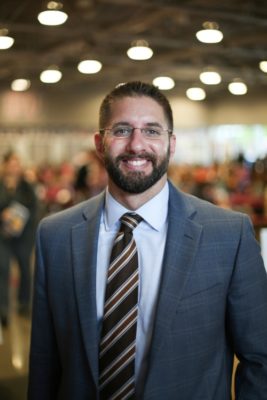
Theology course inspires students to re-examine their views on character and religion
What do Apple commercials, creation myths and Pope Benedict XVI have in common? They are all staples of a theology class at Notre Dame that works to give its students an in-depth look at the nature and character of God.
For the last four years, theology Professor Leonard DeLorenzo had taught “The Character Project: On Developing Character” to students with a goal of teaching them foundational principles of a Christian-Catholic worldview of God, creation, and humanity’s relationship with both.
The students are not required to buy into his arguments — just hear them out. But what the professor has found, he said, is that after the course, students show they leave with a broader and deeper understanding of God.
“A university education was meant to be formative and having to do with character, not just the acquisition of skills,” DeLorenzo told The College Fix in a telephone interview.
 “What we do is study the Catholic understanding of the development of character,” he said. “The students are not required to buy in to this vision, but they are required to study it and seek to understand it.”
“What we do is study the Catholic understanding of the development of character,” he said. “The students are not required to buy in to this vision, but they are required to study it and seek to understand it.”
“This is an attempt to recover what a university education is meant to be,” he added. “You’re not going to capture that all in one course, but I am very conscious of what a university education is meant to be, what a liberal arts is meant to be.”
To be sure, the course is an academic one that meets Notre Dame’s requirement that students take two theology as a condition of graduation. But some of DeLorenzo’s former students said they were deeply affected by the course’s ability to change the way the view God, particularly through a questionnaire DeLorenzo (pictured) has students fill out at both the beginning and end of the class.
“By the end of the course, I think I was better able to look back at the questions and understand how I could turn the values that I wished I had or the values that I told people I had into my actual values,” student Hailey Fulwider told The Fix via email.
“So much of our course was about living purposeful, spiritual, and contemplative lives, and habituating new, better practices. By the end of the class, I actually had a comprehension of what sort of practices would lead me the values that I actually wanted to embody.”
DeLorenzo described his 16-week course in a recent op-ed in the Catholic publication Aleteia.
“We study the Christian doctrine of creation, closely reading Genesis 1–2 alongside ancient creation myths as found in the Babylonians and Romans, as well as modern creation myths such as you might find in Apple commercials,” the professor wrote. “We see how in the Judeo-Christian imagination, creation comes about only because God wills it, that the cosmos is described in terms of a temple and ordered towards an ultimate end of worship in fullness of God’s presence.”
“We see how the human being is not only the image and likeness of this free and gracious Creator, but also purposefully formed from the good earth and animated in the most intimate way: through the sharing of breath,” he continued. “We see how original solidarity precedes Original Sin, how speech first communicates blessings before curses, how trust and transparency are natural while deception and self-consciousness spoil this created goodness, and ultimately how the person of Jesus as encountered in the resurrection appearances narratives shows himself as the redemption of all that has been spoiled.”
Anthony Smyth, another former student of DeLorenzo’s, praised the course’s approach to learning, saying the foundational theology course taught him how to think, not what to think.
“Theology courses take challenges that students’ face, and it helps resolve them through an intellectual and informed framework. It teaches students that there is something other and greater than what is in a textbook,” he told The Fix via email.
DeLorenzo said that’s exactly his aim.
“I wanted to have the chance to really help people think through some of their foundational principles, to really get a robust introduction to Catholic understanding of God, the world, human beings, all of that,” he told The Fix.
In his op-ed, the scholar summarized this understanding of God: “In short, God is free and gracious, the world is God’s good creation, and the human being is the union of intentionally formed earth stuff and donated breath. In the light of the Resurrection, it is all seen as good and redeemed as good. This is the foundation of human life.”
DeLorenzo told The Fix that students of all faiths take his class and have told them that regardless of their beliefs — whether Catholic, Christian, Hindu, Buddhist or agnostic — they have all walked away with somewhat of a new understanding of God.
The professor said he knows this because he has them write an essay at the beginning of the course describing their definitions of God and the world, and then has them answer the same questions at the end of course. Invariably, he said, their answers have evolved and show a new depth, appreciate and understanding of the character of God — as well as a better ability to simply think on such questions.
DeLorenzo offered this anecdote as an example.
“One of the best conversations I’ve had, maybe in my entire career of teaching, was for about an hour and a half with the Hindu student, really getting down into the nitty gritty of his religious worldview and what we were studying. Because he noticed how utterly different this was, and I thought it was really productive, and I got to learn from him,” the professor told The Fix.
Other students have experience a similar educational journey.
“At the beginning I think was probably more concerned with choosing an answer that would look good to other people (or an answer that would offend the least possible number of people) but by the end of the semester I was mainly focused on providing an answer that was aligned with what I knew was good, true, and right,” Kathryn Brown, another student who took the course, told The Fix via email.
DeLorenzo told The Fix that this course is not an outlier in the theology department at Notre Dame, and that it has inspired students to become theology majors or minors.
As he explains in his column: “This kind of education is a reminder of what university education was meant to be in the first place: the cultivation of young minds towards a coherent and well-informed view of the world and of human beings.”
MORE: Decades-old syllabus inspires ‘hardest course’ ever
IMAGE: Shutterstock
Like The College Fix on Facebook / Follow us on Twitter





Please join the conversation about our stories on Facebook, Twitter, Instagram, Reddit, MeWe, Rumble, Gab, Minds and Gettr.